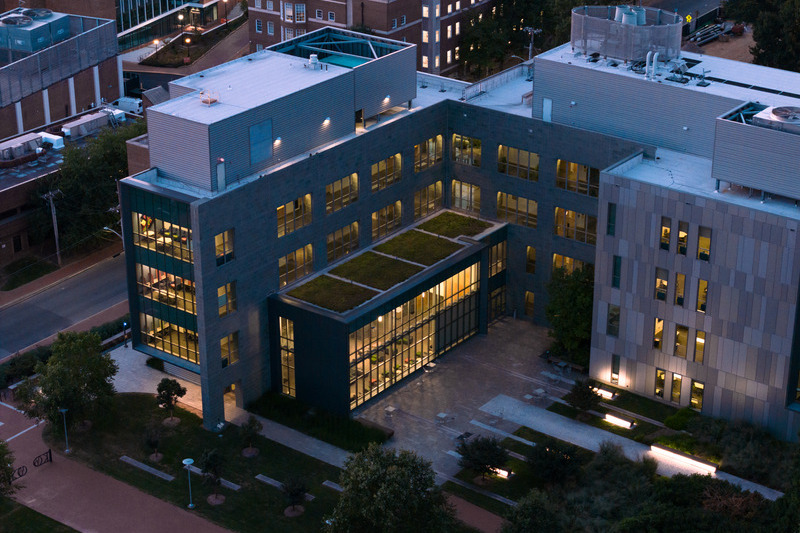
Programs and Courses
ISLL Courses
The ISLL houses two types of courses. The “iBC: integrated Biology and Chemistry” course series delivers interdisciplinary instruction for a broad population of life science majors. Interdisciplinary “SCEN” courses coach general education majors to discover science in the world around them. Both, iBC and SCEN courses are housed in the Interdisciplinary Science Learning Laboratories.
Integrated Biology and Chemistry (iBC)
iBC Integrated offerings of Introductory Biology I and II and General Chemistry I and II, Lecture and Lab. *Students must enroll in the same section number for all bio and chem classes in a semester.
| Course name | Course name |
|---|---|
BISC207 (lecture) BISC208 (lecture) BISC217 (lab) BISC218 (lab) |
CHEM103 (lecture) CHEM104 (lecture) CHEM133 (lab) CHEM134 (lab) |
Honors Integrated Biology and Chemistry
The Honors Integrated Biology and Chemistry (HiBC) courses intertwine biological and chemical concepts to bring chemistry to life while helping students understand biological structures and processes that make life unique.
SCEN
The courses beginning with “SCEN” represent a variety of opportunities for non-science majors. A primary goal of SCEN courses is to help students develop scientific literacy, critical thinking skills, and build their scientific curiosity, which prepares them to be engaged global citizens in the 21st century.
STEM Education
The University of Delaware offers accredited undergraduate degrees in Secondary Science Education (Biology, Chemistry, Earth Science, and Physics) that combine scientific study with teaching methods and lead to certification. The Master’s in STEM Education includes both certification and non-certification tracks, available through a 4+1 program or a one-year accelerated route, both featuring a year-long classroom internship.
Introductory Biology and Chemistry
The integrated biology and chemistry programs (known as iBC) offer a unique flavor of our introductory biology and chemistry courses that brings biology and chemistry together in both the laboratory and lecture components of the course.
Program Highlights:
iBC1 is offered every Fall semester and encompasses BISC207 (Introductory Biology I), BISC217 (Introductory Biology I Lab), CHEM103 (General Chemistry I), and CHEM133 (General Chemistry Laboratory I).
iBC2 is offered every Spring semester and encompasses BISC208 (Introductory Biology II), BISC218 (Introductory Biology II Lab), CHEM104 (General Chemistry II), and CHEM134 (General Chemistry Laboratory II).
Honors and non-honors sections are offered.
Intentional alignment of biology and chemistry content in both lab and lecture course components.
Inquiry-based laboratory modules that incorporate biology and chemistry approaches to scientific exploration
Emphasis on building quantitative reasoning, critical thinking, and science communication skills.
Support from an extensive teaching team of Faculty, Preceptors, Lab Staff, Undergraduate Peer Facilitators and TA’s.
Who’s eligible? Any student who intends to enroll in introductory biology and chemistry concurrently. Please note that enrollment in CHEM103 requires the following corequisites: MATH 114, MATH 115, or MATH 117. Students whose MATH Placement Examination score placed them in MATH 221 or higher need not take a MATH course coincident with CHEM 103.
Any student who intends to take both introductory biology and chemistry concurrently are eligible and encouraged to enroll in the iBC Program. Please contact your academic advisor for information on enrolling in sections of these courses that are designated as part of the integrated program.
Honors Integrated Biology and Chemistry (HiBC)
The Honors Integrated Biology and Chemistry (HiBC) courses intertwine biological and chemical concepts to bring chemistry to life while helping students develop sophisticated models of interdisciplinary relationships that blend biological structures and chemical processes that make life unique. The discipline-specific concepts are taught iteratively in a collaborative studio setting where students work together to construct system models both digitally and on our writable walls. Lectures are intentionally centered around the laboratory experience, wherein we blend guided and open inquiry lab activities with application to contemporary contexts such as biofuels, aquatic ecosystems, plant transpiration, and ultraviolet mutagenesis. These lab experiences offer students rich opportunities to blend conceptual and practical skills in a manner that promotes an interdisciplinary mindset.
Our integrated curricula are intentionally aligned with the University of Delaware’s goals for general education to facilitate holistic development of skilled and educated citizens and scientists. We support students as they become engaged members of this community by building in opportunities to interact with the teaching team, including undergraduate integrated honors alumni, graduate students, preceptors and faculty, on a daily basis.
The format of HiBC courses facilitates the learning of science as science is done, i.e. by making authentic observations to find patterns in nature and then testing hypotheses through experimentation. Furthermore, the learning community nurtures collaborative work that helps students iteratively develop and build upon durable skills such as science communication, problem solving, system modeling, and data analysis skills in the context of application of foundational biological and chemical concepts (Figures 1a-1b).
Students engage directly with scientific inquiry and present their findings and knowledge across multiple audience groups and media formats. Scientific poster presentations showcase individual research projects, while a press conference offers a different type of skill development, communicating science to non-scientists. The poster presentations conclude our modular lab schedule, which includes topics such as UV mutagenesis, Biofuels, Plant Transpiration, and Aquatic Ecology (Figure 2). The press conference is a collaborative effort between HiBC, journalism, and media production students, creating a dynamic intersection between science and media communication (Figure 3).
HiBC strives to embody the spirit of the scientific community, placing scientific exploration, collaboration, communication and critical thinking skills integral to the learning of discipline specific concepts. We encourage you to read student testimonials below and to please reach out either to chemistry faculty, Jacqueline Fajardo, Ph.D. jfajardo@udel.edu or biology faculty, Alenka Hlousek-Radojcic, Ph.D. alenkahr@udel.edu for further information.
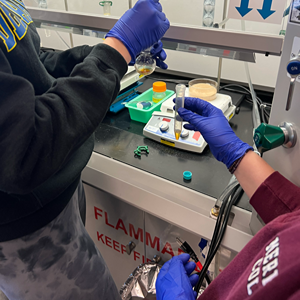
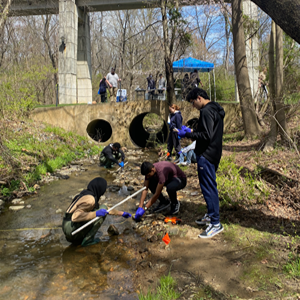
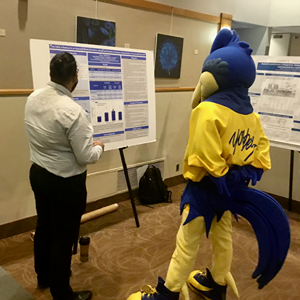
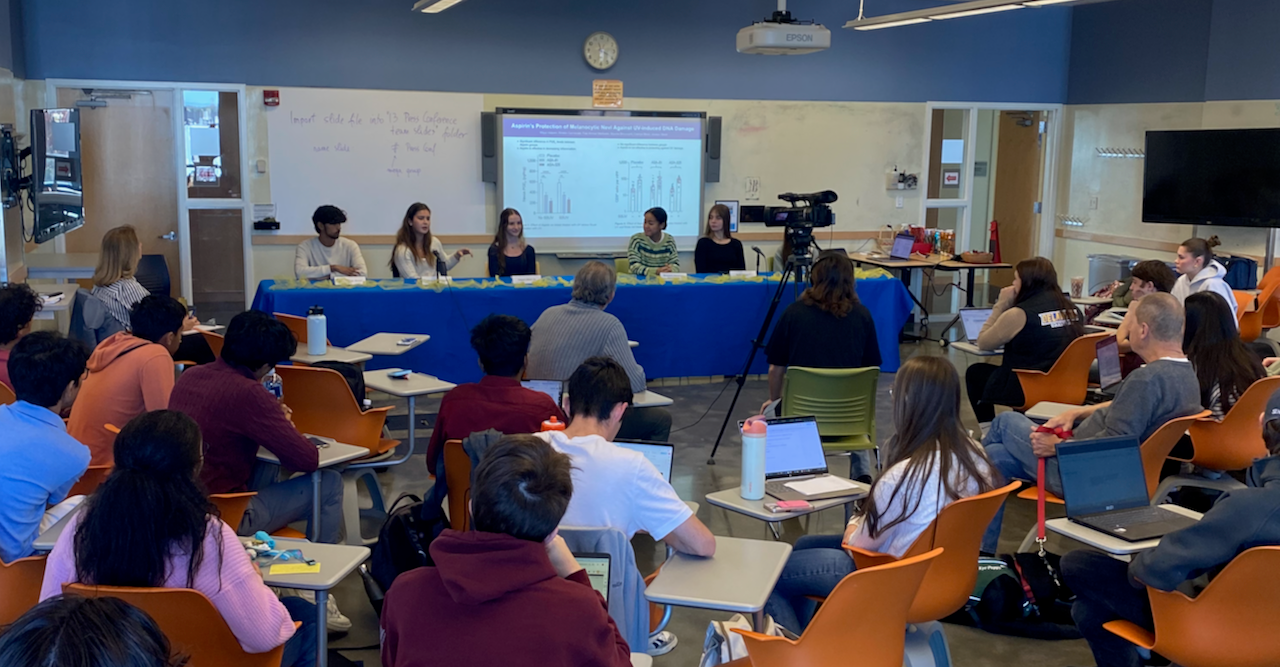
“I think that the relation of chemistry labs to biology in the Honors Integrated Labs was very interesting. For example, the tie between kinetics, gas laws, and acid/base to the carbonic anhydrase enzyme and carbonic acid-bicarbonate blood buffer system was very interesting. Even the post lab's ties to respiration and acidosis and alkalosis were all interesting connections.”
“...I also began realizing that I had more of an enjoyment for chemistry than I previously thought, as iBC presented material that would often connect both biology and chemistry.”
“In past science classes I’ve taken, we did some lab work, but this class took it to the next level. It was the first time I had the opportunity to fully participate hands-on in labs that directly corresponded to what we were learning in class while also having room to complete our own experiments and form conclusions. I felt labs enhanced my ability to understand the material from class because I could directly see why certain things worked the way they did.”
"The biggest thing that helped me learn was all the support I received from the teaching team, and the professor, as well as my peers. Integrated created a real sense of community that was wildly beneficial for my learning this freshman year. Everything that integrated has done has allowed me to socialize and make connections with peers, and faculties, which allowed my learning to continue to expand. I could always count on everyone in this class, including the teaching team. Office hours were amazing, the workshop was wonderful, and I really felt supported. Integrated was an amazing experience, and I am sad to leave it.”
SCEN Courses
The SCEN courses are housed in the Dupont Interdisciplinary Science Learning Laboratories as of fall 2017.
The courses beginning with “SCEN” represent a variety of opportunities for non-science majors, ranging from Physical Science and Astronomy (SCEN 101), Snack Science (SCEN 107), Art of Botany (SCEN 109), Revolutionary Science (SCEN 111), and Origami Science (SCEN 115) to courses for Elementary Teacher Education majors and current high school teachers (SCEN 650). SCEN courses offer students the opportunity to delve into the connections between science and the real-world. Plus, students develop scientific literacy, critical thinking skills, and build their scientific curiosity, which allows them to be engaged global citizens in the 21st century.
SCEN 101 focuses on an integrated approach to Physical Science, where pre-service teachers and other majors learn to connect physics concepts to real-life situations and other disciplines. The SCEN101 education team promotes holistic student development and encourages both individual and group participation through interactive learning.
This 1 credit seminar course is designed for students who are concurrently serving as undergraduate peer facilitators for a STEM course, and who are interested in the science behind learning in the STEM disciplines. This course helps students integrate educational theory, pedagogy, and practice within the context of their role in the classroom. It will touch on theoretical issues in conceptual development, conceptual change, collaborative learning and students’ conceptions of various topics in science, as well as practical issues encountered in facilitating learning, engaging in formative assessment, and responsive teaching.
Science and scientists are part of a living, breathing world and the straightforward discoveries that are presented in textbooks often have remarkable backstories. This course will explore a specific scientific discovery, or set of discoveries and the events that shaped them. Specific scientific topics will vary by semester.
When this course is offered as part of a study abroad program, the goal is to immerse ourselves in the place where that semester’s topic was primarily taking place. This allows us to better understand the context of that scientific breakthrough, and in many cases walk in the actual footsteps of the primary figures. And, understanding those contexts and how they shaped the discovery process is the main goal of this course.
This understanding of the contexts associated with scientific progress can also help us draw parallels to modern times, and how politics, religion, and media can shape that scientific progress.
The practicum experience provides students the opportunity to apply and integrate knowledge acquired through their coursework. This experience engages learners in direct experience as a leader, supported by focused reflection in order to increase their knowledge, develop skills, clarify values, and develop their capacity to contribute to their discipline and the educational community. Any student who is working as an undergraduate peer facilitator in a STEM course is eligible to enroll in SCEN330.
Secondary STEM Education
The Secondary Science Education major at the University of Delaware consists of both undergraduate and graduate programs, offering students interested in teaching middle or high school science the opportunity to study their scientific area of interest while also learning about and practicing standards-aligned and the best teaching methods. Bachelor’s degrees are offered in Biology Education, Chemistry Education, Earth Science Education, and Physics Education. All programs are accredited by the Council for the Accreditation of Educator Preparation (CAEP). Students complete the requirements for a Liberal Arts degree by majoring in their content area and taking professional education courses as well. Qualified students can enroll in Honors sections of several laboratory and lecture sections each semester. On completing the state-approved program’s requirements students will receive the university’s endorsement for teaching certification.
The Masters in STEM Education degree has two tracks (certification and non- certification) and can be accessed via two ramps — the 4+1 route, and the accelerated one-year route. Through the former, undergraduates in various STEM majors across the university can apply for admission to the program at the end of their junior or at the beginning of their senior years. These students will take two introductory graduate level courses at the undergraduate tuition rate. The following summer, they will take two additional courses as graduate students. The accelerated route is open to applicants who have already earned their undergraduate degree in Biology, Chemistry, Earth Science, Physics, Math or Agricultural Science. Upon acceptance into the program, these set of students will take two courses in summer 1 and summer 2 respectively. Starting in the fall, students converging from both ramps will spend a year in an all-day school-based internship (residency experience) while concurrently enrolled in teaching methods courses.

